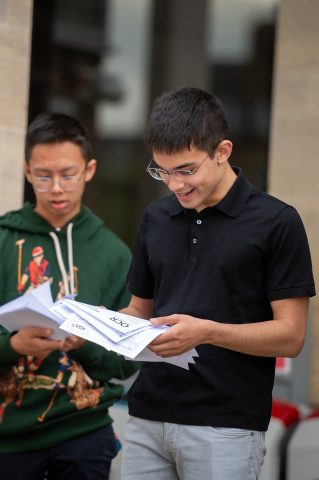Latin and Greek
Departmental philosophy
In the Classics Department we have the privilege of teaching and handing on a subject that is unique, and to which our culture is deeply indebted. Latin and Greek open the door to linguistic understanding, to a fascinating world of story, myth and legend, to the origins of drama, European (and non-European) literature, philosophy, and architecture, and to the history of two great civilisations. Latin and Greek, however, are also a means to an end. Very important in our teaching (and an important part of our raison d’être) are the links between these classical languages and the “modern” Romance languages – French, Spanish and Italian. We strive to point these out, at the same time emphasising that 65% of English vocabulary is derived from Graeco-Latin roots.
Latin and Greek are not something to be hidden away as dead languages – on the contrary they are the very life of the minds that know them. We passionately believe that they are worthy of study in their own right, and that the pupils who study them should have a chance to be fascinated and challenged by them, and potentially develop their own passion for the subjects we hold so close to our own hearts as teachers.
Latin and Greek are the enemies of sloppy, careless thought and language, and demand precision and accuracy. The classical languages, therefore, are not only gateways to the ancient world but have an important role to play in the educational and intellectual development of the individual. What a privilege it is to teach a subject one loves in a school where staff and students work so beautifully together. The formal courses we provide are just the starting points in the classical education on offer – the wide ancient world is open for discovery at MCS.
"Virtue…is a mean between two vices, one of excess and one of deficiency"
Aristotle, Nichomachean Ethics
Sixth Form
Pupils may choose to study (OCR) Latin and/or Greek in the Sixth Form, courses that, like the GCSE ones, have both linguistic and literary elements. Language skills are developed with the aim that, by the end of the two-year course, students will be able to approach both unseen prose and verse literature with confidence. Two prose and two verse authors are studied on the literature side of things and analysis of these texts is deep and fulfilling. There is always a range of texts available: tragedy, history, oratory, lyric/elegiac/epic poetry, philosophy all play their part in different areas of the courses. A study of Latin and Greek at A Level provides a student not just with a superb grasp of how the ancient languages function and the way ancient peoples viewed the world but also goes a long way to investigate our own origins as a thinking people living within a democracy.
Extra-curricular
The Classics Department puts on a significant number of extra-curricular activities. From the Ancient History Club run for the 3rd Form to the Symposium (a Sixth Form seminar and reading group), from language support sessions across school year groups to the Latin Prose and Verse Composition Club there is a broad range of activities designed to be accessible to a large number of students. We have a number of speakers (mainly from Oxford University) give talks to interested classicists through the year and encourage students to enter essay competitions and attend summer courses where they want to investigate their interest in the subject. We enter the Oxfordshire Classical Reading Competition each year and have an enviable record in preparing some successful and entertaining speakers.
We try to run a trip abroad each year and have recently been to Italy (Bay of Naples), Greece, and Sicily.
Where Latin and Greek could take you
Students of all types leave MCS each year to study a range of classically related subjects at university: Classics, Ancient History, Ancient and Modern History, and Archaeology. Those who take Latin and Greek at A Level also go on to read almost any other subject under the Sun: Medicine, Physics, Philosophy, Modern Languages, Economics, etc. The classical languages are superb conduits for the development of rigorous thinking and the application of detailed rules and use of data. Latin and Greek are not just for the few.
 MCS ranks among the top independent secondary schools in The Sunday Times Schools Guide 2024, placed seventh nationally and third in the Southeast.
MCS ranks among the top independent secondary schools in The Sunday Times Schools Guide 2024, placed seventh nationally and third in the Southeast.

 39 of our pupils achieved 10 or more 8 or 9 grades in 2023.
39 of our pupils achieved 10 or more 8 or 9 grades in 2023.
 Your donations contribute over £150,000 a year to bursaries as well as building an
Your donations contribute over £150,000 a year to bursaries as well as building an 

